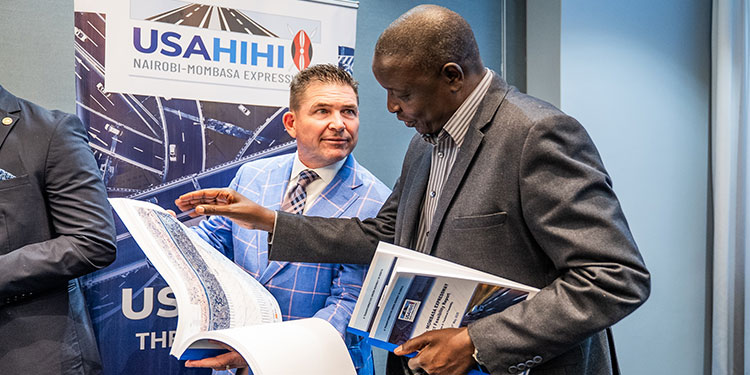
United States-based Everstrong Capital has taken a significant step towards the realization of the Usahihi Expressway project by submitting its comprehensive 2,300-page feasibility study to the Kenya National Highways Authority (KeNHA). This detailed document, delivered recently, delves into the technical, financial, legal, social, and environmental aspects crucial for the project’s implementation, marking a transition from mere concept to actionable plans. Everstrong Senior Advisor Kyle McCarter assured KeNHA of the firm’s unwavering commitment to Kenya’s Public-Private Partnership (PPP) policy, highlighting the proposal as the most transparent and extensive infrastructure undertaking in Kenyan history.
The ambitious Usahihi Expressway, spearheaded by Usahihi Expressway Limited and backed by Everstrong Capital, aims to construct a dual carriageway, potentially with four to six lanes, running parallel to the existing 440-kilometer Nairobi-Mombasa highway. The estimated total cost for this transformative project ranges between $3.5 and $3.6 billion (KES 452 – KES 468 billion). Everstrong intends to secure funding through a combination of domestic and international sources, targeting KES 129 billion ($1 billion) from Kenyan pension funds and financial institutions, and an additional KES 323 billion ($2.5 billion) from global investors. The project will operate under a Build-Operate-Transfer (BOT) model with a 30-year concession period.
It is estimated that construction will start in early 2026 and take about four years to finish. The expressway promises to drastically reduce travel time between Nairobi and Mombasa from over 10 hours to just 4.5 hours. Beyond cutting travel time and decongesting the existing highway, the Usahihi Expressway is expected to generate numerous job opportunities during both its construction and operational phases. Revenue will be primarily generated through toll fees, especially from heavy commercial vehicles, with an estimated cost of Ksh12 to Ksh13 per kilometer for drivers, making it more affordable than the Nairobi Expressway.
The Usahihi Expressway also incorporates sustainability features, including rest stops, wildlife observation points, electric vehicle charging infrastructure powered by renewable energy, and wildlife overpasses, positioning it as a “green and equitable” infrastructure model for Africa. Spanning 459 kilometers, it is poised to become one of the continent’s longest toll highways. Everstrong believes this project will not only ease traffic congestion and unlock new trade avenues but also enhance regional security and Kenya’s overall economic competitiveness. The Usahihi Expressway’s successful completion is expected to signify a dramatic change in the continent’s infrastructure model and serve as a standard for future infrastructure development throughout Africa.
